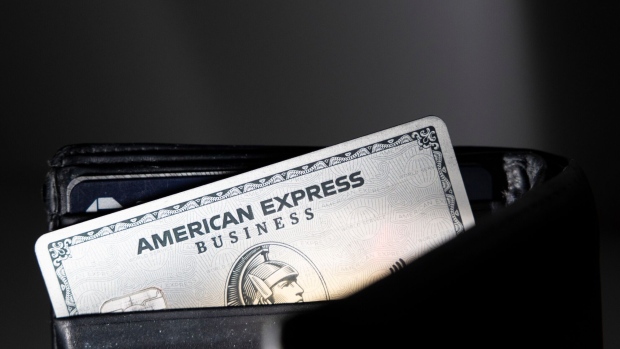Apr 19, 2024
Amex Revenue Jumps as Consumers Flock to Pricey Premium Cards
, Bloomberg News

(Bloomberg) -- American Express Co. reported revenue that topped estimates in the first three months of the year as consumers continued to flock to the company’s premium credit-card offerings.
Revenue jumped 11% to $15.8 billion in the first quarter, the New York-based credit-card giant said in a statement on Friday. That beat the $15.77 billion average of analyst estimates compiled by Bloomberg.
As a result, Amex said it still expects full-year revenue to grow as much as 11% compared to 2023. Earnings per share should still be in a range of $12.65 to $13.15.
“We continue to attract high-spending, high credit-quality customers to the franchise,” Chief Executive Officer Steve Squeri said in the statement.
Spending on the firm’s cards jumped 6% to $367 billion, which was slightly higher than the $366 billion analysts in the Bloomberg survey were calling for. That led to profits of $2.44 billion in the quarter, which also topped estimates.
Amex, known for products like its $695-a-year Platinum card, announced during the quarter that it would revamp its credit-cards with Delta Air Lines Inc., the firm’s largest co-brand partner. The added perks come with higher annual fees.
Consumers have continued to flock to such products and cards that come with a fee accounted for 70% of Amex’s new account acquisitions in the quarter. Net card fees soared 15% to $1.97 billion.
Spending on airline travel jumped 9% in the quarter and that was boosted by bookings for so-called front-of-cabin tickets, like first class or business class seats, Chief Financial Officer Christophe Le Caillec said in an interview.
“The demand for premium products is not abating,” Le Caillec said. “We’re not seeing any softness at all in terms of demand for premium cards.”
The firm set aside $1.3 billion to cover loans that go bad. While that was higher than the $1.1 billion in provisions it recorded a year ago, it was in line with analyst expectations.
The move comes as industrywide credit-card delinquency rates reached their highest level since at least 2012, according to a recent report by the Federal Reserve Bank of Philadelphia.
(Updates with net card fees in seventh paragraph, CFO comment in eighth.)
©2024 Bloomberg L.P.





